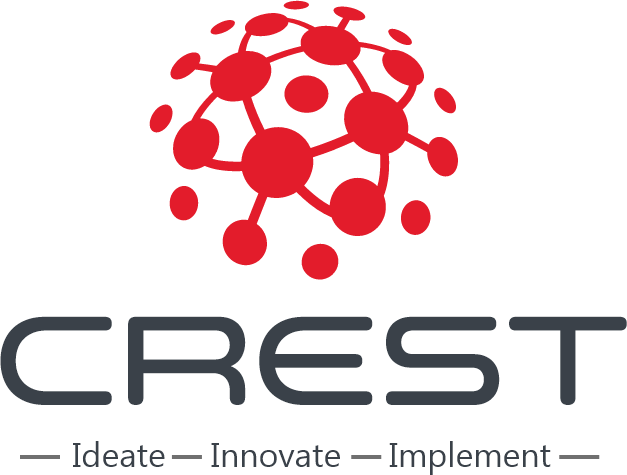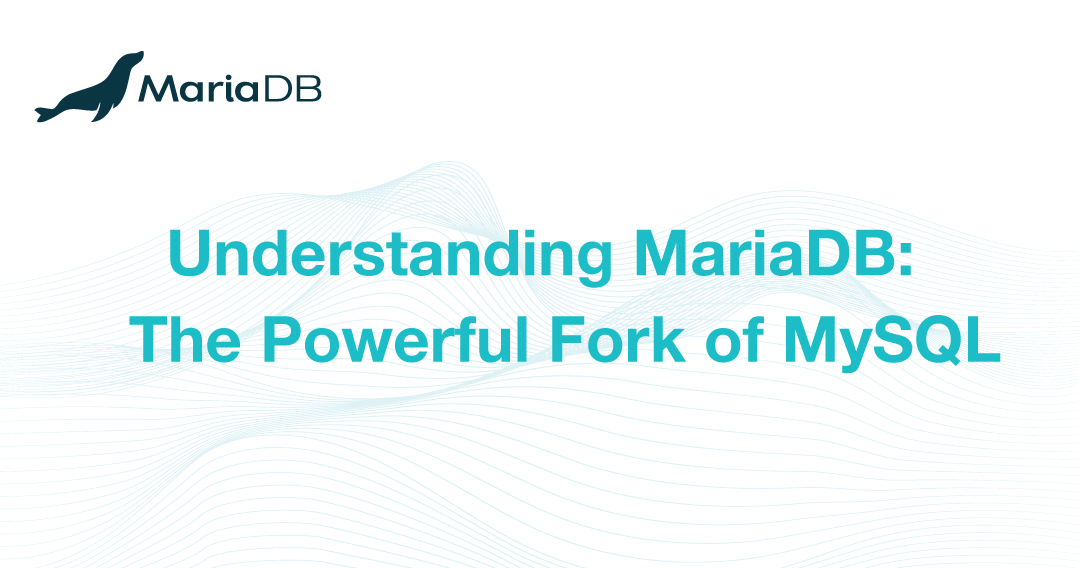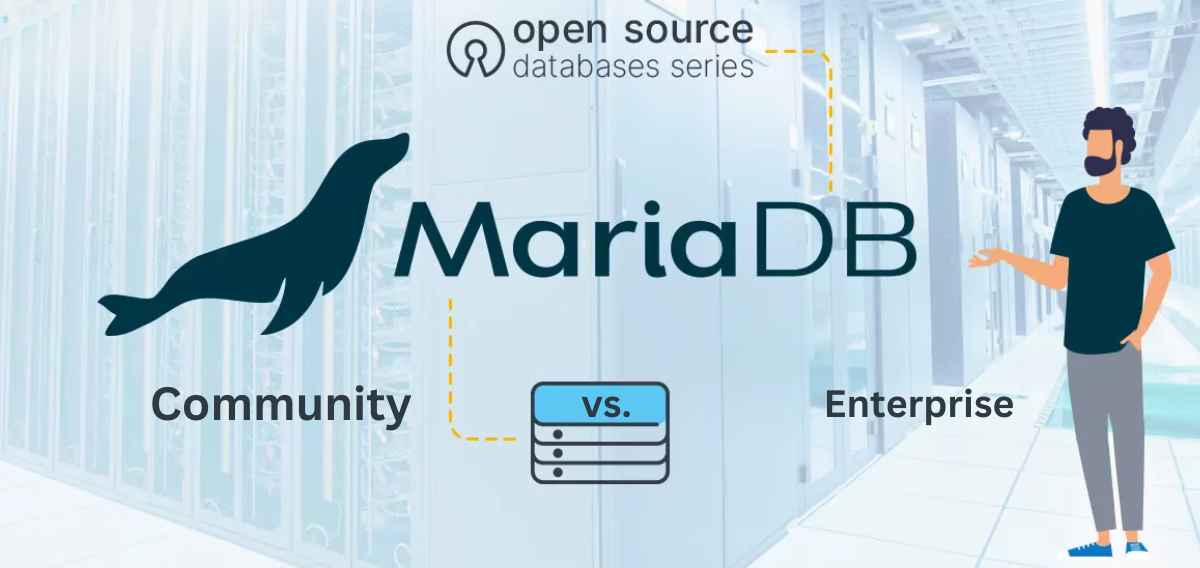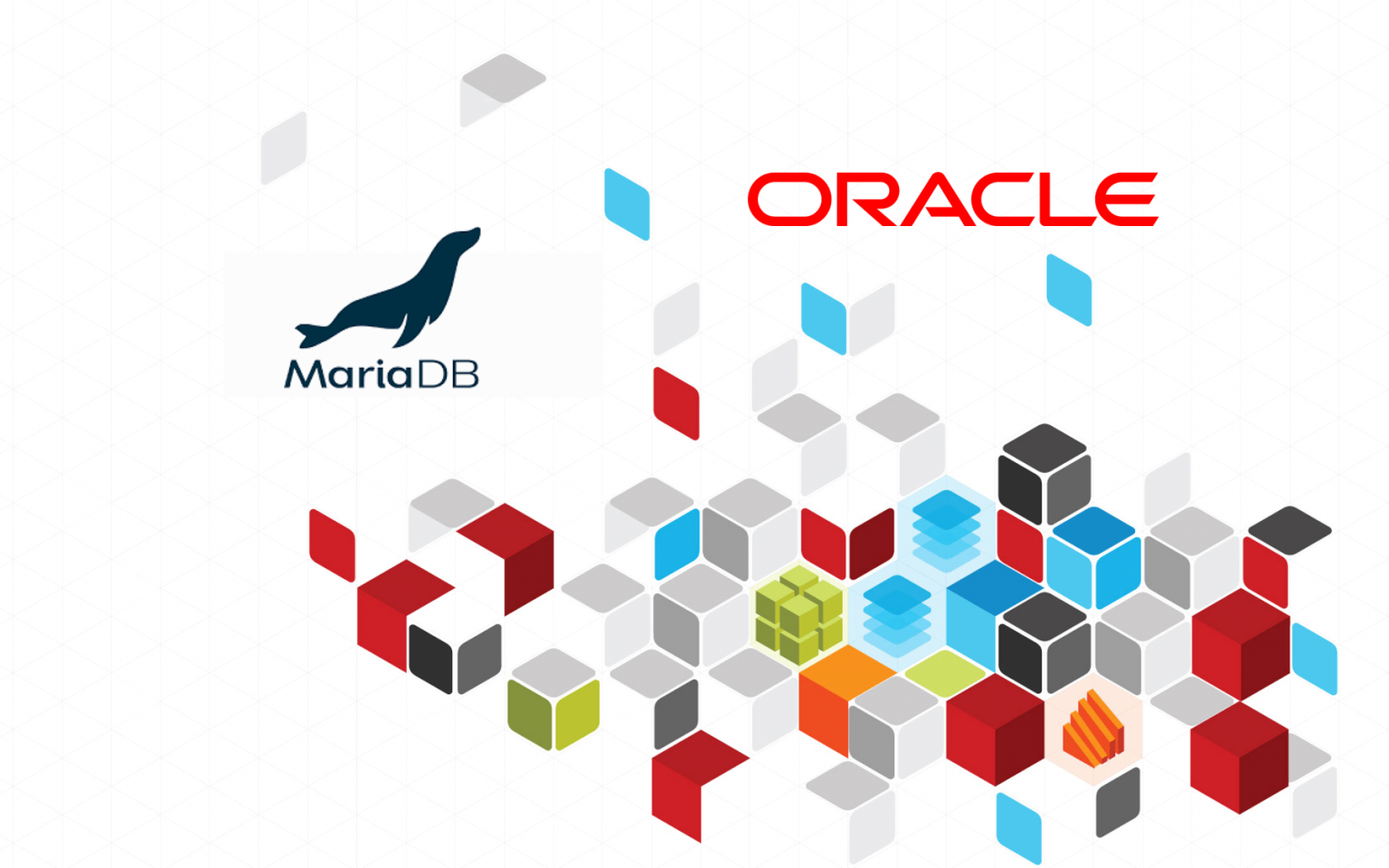Komunitas MariaDB vs Perusahaan: Perbandingan Komprehensif
MariaDB adalah sistem manajemen basis data relasional yang kuat yang menawarkan dua edisi utama: MariaDB Community dan MariaDB Enterprise. Setiap edisi dirancang untuk memenuhi kebutuhan dan kasus penggunaan yang berbeda, menyediakan berbagai fitur dan kemampuan. Blog ini mengeksplorasi perbedaan antara MariaDB Community dan MariaDB Enterprise, dengan perbandingan terperinci mengenai kemampuan mereka, termasuk dukungan untuk mesin Columnar dan S3, integrasi dengan KMS dan Kafka, kompatibilitas Oracle, prosedur tersimpan PL/SQL, dan Long-Term Support (LTS). Kami juga akan memeriksa kinerja MariaDB Enterprise pada IBM Power 10 dan Operator Kubernetes-nya.
Gambaran Umum Komunitas dan Perusahaan MariaDB
MariaDB Community adalah edisi sumber terbuka yang dikelola oleh MariaDB Foundation. Ini tersedia secara gratis dan digunakan secara luas oleh para pengembang, perusahaan rintisan, dan bisnis kecil hingga menengah. Edisi Komunitas mencakup fitur-fitur inti MariaDB dan dikenal dengan performa, keandalan, dan dukungan komunitas yang luas. MariaDB Enterprise adalah versi yang didukung secara komersial, versi yang diperkuat keamanannya yang dirancang untuk organisasi dengan kebutuhan yang lebih kompleks dan berat. Versi ini mencakup semua fitur dari edisi Komunitas ditambah dengan alat tambahan, fitur keamanan tingkat lanjut, dan layanan dukungan profesional. Versi ini dirancang untuk perusahaan besar dan aplikasi mission-critical yang membutuhkan kinerja, keamanan, dan dukungan yang ditingkatkan.
Perbedaan Utama Antara Komunitas MariaDB dan Perusahaan
1. Dukungan dan Pemeliharaan
Komunitas MariaDB:
- Dukungan: Dukungan komunitas melalui forum, milis, dan sumber daya online. Tidak ada jaminan dukungan atau perjanjian tingkat layanan (SLA).
- Pembaruan: Pembaruan rutin dan perbaikan bug yang disediakan oleh MariaDB Foundation dengan kontribusi komunitas.
MariaDB Enterprise:
- Dukungan: Dukungan profesional dari MariaDB Corporation, termasuk dukungan 24/7, bantuan di tempat, dan perjanjian tingkat layanan (SLA). Staf dukungan khusus membantu dengan pemecahan masalah dan pengoptimalan performa.
- Pembaruan: Akses ke fitur premium dan pembaruan tepat waktu, termasuk akses awal ke fitur-fitur baru dan patch penting.
2. Fitur dan Kemampuan
| Fitur | Komunitas MariaDB | MariaDB Enterprise |
| Mesin Basis Data Inti | Ya | Ya |
| Fitur Keamanan Tingkat Lanjut | Dasar (misalnya, SSL/TLS) | Disempurnakan (misalnya, Enkripsi Data-at-Rest, Audit Tingkat Lanjut) |
| Solusi Pencadangan | Alat bantu bawaan (misalnya, mysqldump) | Solusi Pencadangan Perusahaan (misalnya, Pencadangan MariaDB, Pemulihan Point-in-Time) |
| Ketersediaan Tinggi | Dasar (misalnya, Replikasi) | Tingkat Lanjut (misalnya, Galera Cluster, MaxScale Load Balancer) |
| Skalabilitas | Baik | Sangat baik (misalnya, Sharding, Mesin Penyimpanan Perusahaan) |
| Optimalisasi Kinerja | Alat bantu standar (misalnya, Cache Kueri) | Alat bantu tingkat lanjut (misalnya, Skema Performa, Pengoptimalan Kueri) |
| Pemantauan dan Manajemen | Alat bantu pemantauan dasar | Alat bantu pemantauan tingkat lanjut (misalnya, MariaDB Enterprise Monitor) |
| Konsultasi dan Pelatihan | Sumber daya masyarakat | Layanan konsultasi dan pelatihan profesional |
| Kepatuhan dan Sertifikasi | Terbatas | Komprehensif (misalnya, GDPR, HIPAA) |
| Integrasi dengan KMS | Dukungan terbatas | Integrasi tingkat lanjut dengan Sistem Manajemen Kunci (KMS) |
| Integrasi dengan Kafka | Dukungan terbatas | Dukungan tingkat lanjut untuk streaming data waktu nyata dengan Kafka |
| Kompatibilitas Oracle | Kompatibilitas dasar | Kompatibilitas yang ditingkatkan dengan Oracle, termasuk alat bantu migrasi dan sintaks SQL |
| Dukungan untuk PL/SQL | Terbatas | Dukungan lanjutan untuk prosedur dan fungsi tersimpan PL/SQL |
| Dukungan Jangka Panjang (LTS) | N/A | Ya (versi LTS dengan dukungan dan pemeliharaan yang diperpanjang) |
| Mesin Kolom | Tidak | Ya (mendukung ColumnStore untuk beban kerja analitis) |
| Mesin S3 | Terbatas | Dukungan lanjutan untuk integrasi penyimpanan S3 |
- Keamanan
Komunitas MariaDB:
- Fitur keamanan dasar termasuk SSL/TLS untuk enkripsi data saat transit dan metode autentikasi sederhana. Konfigurasi keamanan tingkat lanjut terbatas.
MariaDB Enterprise:
- Fitur keamanan tingkat lanjut seperti Enkripsi Data-at-Rest, kontrol akses yang halus, dan kemampuan audit yang kuat. Berintegrasi secara mulus dengan Sistem Manajemen Kunci (KMS) untuk meningkatkan perlindungan data dan kepatuhan terhadap peraturan.
- Pencadangan dan Pemulihan
Komunitas MariaDB:
- Alat pencadangan dasar seperti mysqldump dan mysqlhotcopy. Pemulihan Point-in-Time (PITR) memerlukan konfigurasi manual.
MariaDB Enterprise:
- Solusi pencadangan tingkat perusahaan termasuk MariaDB Backup, yang mendukung pencadangan tambahan dan Point-in-Time Recovery (PITR) dengan keandalan tingkat lanjut dan kemudahan penggunaan.
- Ketersediaan dan Skalabilitas Tinggi
Komunitas MariaDB:
- Mendukung replikasi dan pengelompokan dasar untuk ketersediaan yang tinggi. Galera Cluster tersedia tetapi membutuhkan pengaturan tambahan.
MariaDB Enterprise:
- Solusi ketersediaan dan skalabilitas tinggi yang canggih seperti Galera Cluster dengan alat manajemen terintegrasi, MaxScale Load Balancer, dan kemampuan sharding untuk penskalaan horizontal.
- Optimalisasi Kinerja
Komunitas MariaDB:
- Alat bantu pengoptimalan kinerja standar termasuk cache kueri dan analisis kueri dasar.
MariaDB Enterprise:
- Alat pengoptimalan kinerja tingkat lanjut seperti Performance Schema, Query Optimizer, dan MariaDB Enterprise Monitor. Alat-alat ini membantu mengidentifikasi dan mengatasi hambatan kinerja dengan lebih efektif.
- Pemantauan dan Manajemen
Komunitas MariaDB:
- Pemantauan dasar melalui perintah SHOW dan alat bantu eksternal.
MariaDB Enterprise:
- Alat pemantauan tingkat lanjut seperti MariaDB Enterprise Monitor, yang menyediakan metrik kinerja real-time, peringatan, dan diagnostik terperinci.
- Integrasi dengan KMS
Komunitas MariaDB:
- Dukungan terbatas untuk integrasi dengan Sistem Manajemen Kunci (KMS) untuk mengelola kunci enkripsi.
MariaDB Enterprise:
- Integrasi tingkat lanjut dengan KMS, memfasilitasi manajemen kunci enkripsi yang aman dan kepatuhan terhadap peraturan perlindungan data.
- Integrasi dengan Kafka
Komunitas MariaDB:
- Dukungan asli yang terbatas untuk integrasi dengan Kafka untuk streaming data dan pesan secara real-time.
MariaDB Enterprise:
- Dukungan yang ditingkatkan untuk mengintegrasikan dengan Kafka, memungkinkan streaming data real-time yang efisien dan sinkronisasi antara MariaDB dan sistem berbasis Kafka.
- Kompatibilitas Oracle
Komunitas MariaDB:
- Kompatibilitas dasar dengan Oracle, termasuk beberapa kesamaan sintaks SQL. Migrasi dari Oracle ke MariaDB mungkin memerlukan penyesuaian manual.
MariaDB Enterprise:
- Kompatibilitas Oracle yang ditingkatkan dengan alat migrasi tingkat lanjut dan dukungan untuk sintaks Oracle SQL. Ini termasuk fitur untuk memigrasi prosedur tersimpan, pemicu, dan fungsi khusus Oracle lainnya ke MariaDB.
- Dukungan untuk PL/SQL
Komunitas MariaDB:
- Dukungan terbatas untuk prosedur dan fungsi tersimpan PL/SQL. Kode PL/SQL sering kali memerlukan penulisan ulang atau adaptasi secara manual.
MariaDB Enterprise:
- Dukungan tingkat lanjut untuk prosedur dan fungsi tersimpan PL/SQL, membuatnya lebih mudah untuk memigrasi aplikasi dari Oracle ke MariaDB. Ini termasuk kompatibilitas untuk kode PL/SQL dan alat untuk membantu konversi.
- Dukungan Jangka Panjang (LTS)
Komunitas MariaDB:
- Tidak ada dukungan jangka panjang atau opsi pemeliharaan yang diperpanjang.
MariaDB Enterprise:
- Menyediakan versi Dukungan Jangka Panjang (LTS), yang mencakup dukungan dan pemeliharaan yang diperpanjang, memastikan stabilitas dan keandalan untuk penerapan perusahaan dalam jangka waktu yang lebih lama.
- Mesin Kolumnar
Komunitas MariaDB:
- Tidak ada dukungan untuk mesin penyimpanan Columnar.
MariaDB Enterprise:
- Mendukung ColumnStore, mesin penyimpanan kolom yang dirancang untuk beban kerja analitis, memungkinkan penyimpanan dan kueri yang efisien untuk kumpulan data yang besar.
14. Mesin S3
Komunitas MariaDB:
- Dukungan terbatas untuk integrasi dengan penyimpanan S3.
MariaDB Enterprise:
- Dukungan lanjutan untuk integrasi penyimpanan S3, memungkinkan MariaDB berinteraksi dengan Amazon S3 atau MinIO S3 untuk penyimpanan data yang dapat diskalakan dan hemat biaya.
15. Konsultasi dan Pelatihan
Komunitas MariaDB:
- Dukungan dan dokumentasi berbasis komunitas. Layanan konsultasi dan pelatihan profesional tidak termasuk.
MariaDB Enterprise:
- Layanan konsultasi dan pelatihan yang komprehensif termasuk sesi pelatihan khusus, lokakarya, dan konsultasi strategis.
MariaDB Enterprise di Linux pada IBM Power 10
Server IBM Power 10 dirancang untuk menangani beban kerja yang berat dengan efisiensi dan keandalan yang tinggi. Menjalankan MariaDB Enterprise di IBM Power 10 memanfaatkan kemampuan canggih server untuk meningkatkan kinerja dan skalabilitas database. Menjalankan MariaDB Enterprise Server dengan Red Hat Enterprise Linux, pelanggan mendapatkan keuntungan hingga 4,22x kinerja pada Power10 vs sistem berbasis Intel x86. Keuntungan utama dari MariaDB Enterprise Server yang berjalan pada server IBM Power mencakup hingga 900.000 transaksi per detik, memungkinkan beban kerja berkinerja tinggi dengan jumlah core yang lebih sedikit dibandingkan platform lain, dan mengurangi biaya perangkat lunak dan dukungan. Kinerja IBM Power10 yang telah teruji menunjukkan bahwa Power merupakan sistem yang mumpuni dan berkinerja tinggi yang sangat cocok untuk beban kerja MariaDB dan permintaan intensif data pelanggan yang terus meningkat. Untuk data yang lebih rinci atau untuk mempelajari bagaimana tolok ukur kinerja dilakukan, tinjau MariaDB Enterprise di Linux pada Laporan Kinerja Power .
Operator Kubernetes untuk MariaDB Enterprise
Operator Kubernetes untuk MariaDB Enterprise menyederhanakan penyebaran, penskalaan, dan pengelolaan basis data MariaDB dalam lingkungan terkontainerisasi. Operator ini terintegrasi dengan Kubernetes untuk mengotomatiskan berbagai tugas operasional. MariaDB operator adalah operator Kubernetes yang memungkinkan Anda untuk menjalankan dan mengoperasikan MariaDB secara cloud native. Operator ini bertujuan untuk mengelola instance MariaDB secara deklaratif menggunakan Kubernetes CRD, bukan perintah imperatif. Operator ini tersedia di Artifact Hub dan Operator Hub dan mendukung fitur-fitur berikut:
- Penyediaan server MariaDB dengan mudah di Kubernetes.
- Server MariaDB yang sangat mudah dikonfigurasi.
- Beberapa mode HA: Replikasi Galera dan SemiSync.
- Failover primer otomatis.
- Pemulihan cluster Galera secara otomatis.
- HA yang disempurnakan dengan MaxScale: proxy database, router, dan penyeimbang beban canggih yang dirancang khusus untuk dan oleh MariaDB.
- Konfigurasi penyimpanan yang fleksibel. Ekspansi volume.
Kesimpulan
Singkatnya, MariaDB Community menawarkan fitur basis data dasar yang cocok untuk kebutuhan umum, termasuk alat keamanan dan kinerja dasar. MariaDB Enterprise, bagaimanapun juga, menyediakan kemampuan tingkat lanjut seperti keamanan yang ditingkatkan, solusi pencadangan yang komprehensif, langkah-langkah kepatuhan yang kuat, dan dukungan untuk prosedur dan paket Oracle PL/SQL Stored untuk kemudahan migrasi dari platform basis data yang mahal. MariaDB Enterprise unggul dengan dukungan 24×7, memastikan bantuan berkelanjutan dan waktu henti yang minimal.





